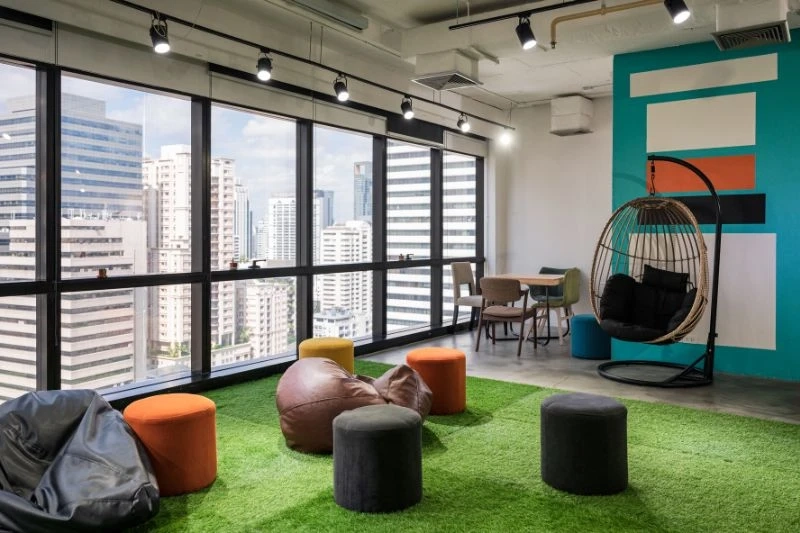For individuals with hay fever in the UK, the spring and summer months typically bring with them an unpleasant array of symptoms such as runny nose and watery eyes. Approximately 95% of persons who have hay fever experience symptoms that are brought on by grass pollen, even if various people are more sensitive to other allergens.
This can significantly reduce the enjoyment of outdoor events and gardening. Sufferers are left huddled together, frustrated, and pining for the chilly, gloomy days of winter instead of taking advantage of the pleasant weather. Fortunately, there is a remedy for everybody with hay fever: artificial grass. Artificial grass is every bit as vivid, brilliant, and captivating as real grass, but it doesn't have the ugly sniffles. It nevertheless provides all the advantages of a well-kept lawn.
Grass pollen, which floats in the air during the spring and summer, can enter our systems and create a variety of issues. People who are allergic to grass endure a variety of unpleasant and occasionally incapacitating responses, such as runny noses, painful eyes, headaches, difficulty breathing, and difficulty sleeping.
It's likely that you have a grass allergy if you experience any of these symptoms in June, July, or August. Reducing your exposure to the grass itself is the greatest approach to avoid having your summer crushed by hay fever symptoms, even though medication can help you manage them.
One of the best and most efficient ways to lessen your symptoms of hay fever is to replace your polluting lawn with robust, long-lasting, and fashionable artificial grass. On lovely summer days, artificial golf grass won't discharge pollen into the air like real grass does, allowing you to enjoy your outdoor space without worrying about uncomfortable, inconvenient side effects.
You might still have some symptoms if your neighbours have lawns close to your house, but the primary cause can be eliminated by replacing your turf with artificial turf, allowing you to use your outside area all summer long.
Steer clear of the allergen to treat your grass allergy as best you can. One of the most prevalent allergies is natural grass. Fortunately, artificial grass provides a long-term solution to significantly lower issues like dust mites and pollen (plus, you won't ever have to worry about trimming or watering again).
Most allergies that cause problems for humans are airborne. Unlike natural grass, artificial turf does not draw in and hold onto this pollen. Our artificial turf, which is made of synthetic fibre and is made to resemble genuine grass, keeps pollen counts down by giving you a beautiful yard without requiring fertiliser or grass seed, which encourages the growth of allergens like mould and weeds.
Artificial grass has become just as beautiful as the genuine thing, thanks to its remarkable resemblance, durability, and hardiness. It's crucial to have a professional install your new synthetic grass if you want it to seem as excellent as possible. After installation, your new garden will require very little upkeep, providing you with a warm, fashionable, and allergy-free space to enjoy all year long!
Health Benefits of Installing Artificial Grass
Boost wellbeing and health: Their popularity can be attributed to the psychological advantages that have been demonstrated when gazing at a lush lawn. But now that the artificial lawn is level and smooth, those with limited mobility can utilise the garden again, maybe for the first time in years. Furthermore, a low-maintenance artificial lawn will significantly enhance your quality of life if you are unable to perform the strenuous physical labour required for raking, watering, and mowing.Synthetic grass won't make your hay fever go away, but it will help your garden become less polluted, allowing you to dry your linens outside and take advantage of bright days when most allergy sufferers stay inside.Artificial grass can significantly lower the risk of allergies. Pollen and other allergens that may be present in natural grass are less common in artificial grass. Choosing synthetic grass for your yard or outdoor space might aid allergy sufferers who commonly experience symptoms like sneezing, coughing, and itchy eyes.It has been demonstrated that spending time in nature lowers stress and anxiety levels. An inviting, verdant lawn can be created in your outside area with artificial grass, producing the same look. Artificial grass can improve your general mood and mental health by fostering a calm and soothing atmosphere.The allure of artificial grass is that it remains unmuddy even after heavy rains, allowing for year-round use. If you enjoy being outside during low pollen counts, you can wear your wellies and head directly to your garden.Imitation grass lessens the quantity of pollen in your yard, which in turn reduces the number of stinging pollinators—mosquitoes, hornets, and wasps—which, despite common perception, are prevalent in gardens in the United Kingdom. Although important for the upkeep of the Great British countryside, pollinators can be dangerous for small children playing in family gardens, and we all know how unpleasant those pesky wasps can be!The potential of artificial grass to reduce the chance of injuries is another advantage to health. Artificial grass maintains a clean and uniform surface, but natural grass can grow uneven or slippery over time. This feature is particularly beneficial to older persons and children because it reduces the chance of falls and other related accidents.Choosing fake grass also reduces the need for hazardous chemicals and pesticides. Fertilizers and insecticides are commonly used to keep natural grass looking attractive, however, these can be toxic to humans and animals. Artificial grass ensures that everyone can enjoy their outside space safely by eliminating the need for such chemicals.The potential of artificial grass to reduce the chance of injuries is another advantage to health. Artificial grass keeps its surface clean and uniform, but natural grass can grow uneven or slippery over time. The possibility of falls and other connected injuries is decreased, which is especially advantageous for senior citizens and

